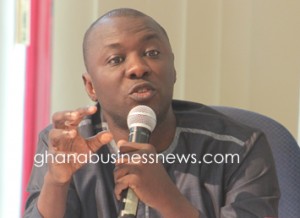Government won’t overburden Ghanaians with taxes – Finance Minister

The government is determined not to overburden Ghanaians with the payment of more taxes, Dr Mohammed Amin Adam, the Finance Minister, has assured.
Rather, the government would ‘use the hard way’ to collect revenue from those who have not been paying the appropriate taxes, as well as those who have been evading taxes in the country.
Dr Amin Adam said this during a press briefing on Saturday, April 13, after Ghana reached a staff-level agreement with the International Monetary Fund (IMF) on the country’s Extended Credit Facility (ECF) arrangement.
The Minister noted that the suspension of the 15 per cent Value Added Tax (VAT) on electricity consumption and GH¢100 annual levy on owners of petrol and diesel vehicles, had created a GH¢1.8 billion revenue gap.
He indicated that there was an urgent need to increase revenue in line with the implementation of the $3 billion loan-support programme, but the government was also being careful not to burden the few Ghanaian taxpayers.
As such, the government would be resolute in ensuring the effective implementation of revenue generation mechanisms announced, both in the 2023 and 2024 budgets, but lacked effective implementation.
“Now, we’re determined to go out there and collect the taxes from those who have not been paying and those who have been evading taxes… to generate the desired revenue to fill the gap created as a result of the suspension of the taxes,” he said.
Dr Amin Adam also stated that the government was pursuing reforms within the tax administration to ensure that proper assessments were done, and people made to pay the appropriate taxes to the state in the easiest and fastest ways possible.
The Minister was quick to add that aggressive revenue mobilisation alone, would not be an ideal situation for the country, therefore, there would be a focus on expenditure rationalisation too.
Responding to a question posed to him by the Ghana News Agency on pragmatic expenditure control measures, he stated that the government had been implementing an arrears clearing plan to address outstanding payments.
Additionally, it was on-boarding more agencies to the Government Integrated Financial Management Information System (GIFMIS) to stop state institutions from spending beyond their budget as well as any unapproved expenditure.
Dr Amin Adam said the government felt the pains that Ghanaians, individuals and businesses alike, had to endure as a result of the implementation of reforms under the ongoing IMF loan-support programme.
While lauding Ghanaians for the sacrifices done since the implementation of the programme in May 2023, he encouraged them to continue to remain patient and sacrificial.
“Some of the reforms that we’re implementing are biting, but I know that we’ll persevere and lead together, and ensure that the benefits of the fiscal consolidation will bring significant relief to the people of Ghana so that we can be counted once again as one of the fastest growing in the world,” he said.
Ms Julie Essiam, the Commissioner-General of the Ghana Revenue Authority (GRA), provided further details on the alternative revenue mobilisation efforts to fill in the GH¢1.8 billion revenue gap created by the suspension of two tax handles.
She said that the Commission had intensified efforts to ensure the effective implementation of compliance measures on foreign income of resident Ghanaians in the country.
In doing so, GRA and the Organisation for Economic Cooperation and Development (OECD) have gone through credible and sustainable structures to ensure it generates the GH¢1.8 billion revenue that the electricity and waste pollution tax were to provide.
Dr Ernest Addison, Governor, Bank of Ghana (BoG), reiterated the government’s determination to making sure that state institutions worked to change the narrative of elections expenditure derailing economic progress in the country.
“In Ghana’s recent history, we have not been able to successfully implement an IMF-supported programme in an election year without derailment,” the Central Bank Governor said.
“The Government and the Central Bank are committed to changing that narrative…and we will remain committed to ensure that programme implementation stays firm,” he added.
Meanwhile, it is expected that when the IMF Board meets in June this year, it would approve Ghana’s $360 million third tranche, following a staff-level agreement reached between Ghanaian Authorities and the IMF Mission Team.
That would bring the total disbursement for Ghana’s ECF arrangement backed by the country’s post-COVID-19 Programme for Economic Growth (PC-PEG) to $1.56 billion.
Already, the country had received the sum of $1.2 billion from the first two tranches since the implementation of the $3 billion- three-year IMF loan-support programme.
The programme is aimed at restoring macroeconomic stability and debt sustainability, build resilience, and lay the foundation for stronger and more inclusive growth.
Source: GNA
